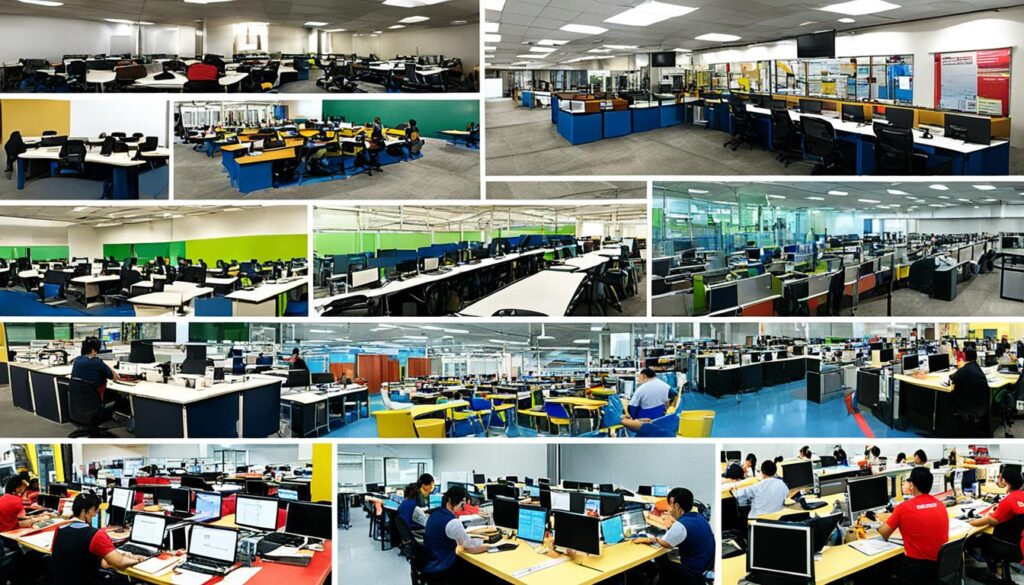Are you looking to develop your skills and excel in your career? Do you believe that real-world experience is key to professional growth? Look no further than on-the-job training (OJT) in the Philippines. OJT plays a crucial role in bridging the gap between academia and industry, providing individuals with the essential knowledge and skills needed to thrive in the workforce. But what exactly is the importance of OJT in the Philippines? How does it contribute to employee development and the overall growth of the workforce?
In this article, we will explore the significance of OJT in the Philippines, understanding its purpose and role in the education system. We will delve into the different types of OJT opportunities available, and how they benefit both students and organizations. Furthermore, we will discuss the advantages of experiential training, the impact of OJT on workforce efficiency for small and medium-sized enterprises (SMEs), and its role in career advancement and employee retention.
Join us as we uncover the key aspects of on-the-job training and discover how it can pave the way for your professional success in the Philippines.

Key Takeaways:
- OJT plays a crucial role in bridging the gap between academia and industry in the Philippines.
- It helps individuals develop industry-specific skills, adapt to professional work environments, and build confidence.
- OJT enhances workforce efficiency for SMEs and contributes to the overall competitiveness of the business sector.
- Experiential training through OJT allows for faster skill development, acclimation to professional work environments, and building confidence in the workplace.
- OJT serves as a strategy for career advancement, employee retention, and nurturing emerging talents in the business sector.
Understanding On the Job Training (OJT)
Definition and Purpose of OJT
On-the-job training (OJT) is a type of training provided at the workplace. Its purpose is to give individuals direct experience in using tools, software, techniques, or equipment used in a professional environment. Rather than relying solely on classroom instruction, OJT enables learners to apply theoretical knowledge in practical settings, enhancing their understanding and proficiency.
OJT serves as a bridge between academia and industry, offering valuable hands-on learning opportunities that prepare individuals for their future careers. By immersing themselves in the actual work environment, trainees gain industry-specific skills, adapt to professional work cultures, and develop the mindset required for success in their chosen fields.
OJT in the Philippine Education System
In the Philippines, OJT is widely incorporated into the education system, particularly in various degree programs. It is a standard requirement for students to undergo OJT to obtain practical experience related to their chosen fields of study. By engaging in OJT, students have the opportunity to apply classroom knowledge in real-world scenarios, developing the skills and competencies necessary for their future careers.
OJT experiences provide students with a holistic understanding of their respective industries, enabling them to gain a competitive edge in the job market. It encourages students to develop a multidimensional skill set that combines both theoretical knowledge and practical expertise, enhancing their employability and professional prospects.
Roles of CHED and Philippine Higher Education Institutions
The Commission on Higher Education (CHED) plays a crucial role in overseeing and regulating OJT programs in the Philippines. CHED ensures that OJT programs align with the prescribed standards and guidelines, fostering high-quality training experiences for students.
Philippine higher education institutions actively collaborate with industry partners to provide OJT opportunities to their students. These partnerships facilitate the integration of real-world work experience into the academic curriculum, enabling students to gain relevant industry insights, network with professionals, and become career-ready upon graduation.
Through the concerted efforts of CHED and Philippine higher education institutions, OJT plays a pivotal role in equipping Filipino students with the practical skills, industry knowledge, and professional competencies necessary to thrive in the dynamic job market.
Different Types of OJT Opportunities in the Philippines
When it comes to on-the-job training (OJT), there are various opportunities available in the Philippines to suit different needs and preferences. Whether you’re a student looking to gain practical experience or an individual seeking to enhance your skills, these OJT options provide valuable learning experiences. Let’s explore the different types of OJT opportunities in the Philippines:
1. Internships
Internships are a popular form of OJT where students work part-time or short-term in a field related to their studies. It allows them to apply their theoretical knowledge in a real-world setting, gain practical skills, and develop industry connections. Internships provide invaluable exposure to the industry and help prepare students for their future careers.
2. Apprenticeships
Apprenticeships offer a unique OJT experience where students learn job skills while earning money. These paid programs combine classroom instruction with hands-on training, allowing individuals to acquire industry-specific skills and knowledge. Apprenticeships provide a pathway to employment by equipping students with the necessary skills sought after by employers.
3. Job Shadowing
Job shadowing involves observing and learning from experienced professionals in the workplace. It provides individuals with an opportunity to gain insights into different roles and industries. By shadowing seasoned employees, individuals can learn firsthand about the specific tasks, responsibilities, and challenges of a particular job. Job shadowing enhances understanding and offers valuable mentorship opportunities.
4. Online Learning Modules
In response to the evolving digital landscape, online learning modules have become increasingly popular for OJT in the Philippines. These modules offer flexible training options that can be accessed anytime, anywhere. With a combination of multimedia resources, interactive exercises, and assessments, online learning modules provide a dynamic and engaging learning experience.
These various types of OJT opportunities in the Philippines cater to different learning styles and preferences. Whether it’s through internships, apprenticeships, job shadowing, or online learning modules, individuals can gain the practical skills and experiences necessary to succeed in their chosen fields. Embracing these OJT opportunities not only enhances personal growth but also contributes to the overall development of the Philippine workforce.

On the Job Training: A Bridge Between Academia and Industry
On-the-job training (OJT) serves as a vital bridge connecting academia and industry in the Philippines. It plays a crucial role in closing the skills gap for Filipino graduates and preparing individuals for professional readiness in the workplace.
Closing the Skills Gap for Filipino Graduates
OJT is instrumental in addressing the skills gap that often exists between the knowledge acquired in academia and the practical skills required by employers in the industry. Through OJT programs, students and graduates gain hands-on experience and develop the necessary skills needed to thrive in the workforce.
The practical training offered during OJT enables Filipino graduates to apply their theoretical knowledge in real-world scenarios. They gain a deeper understanding of their chosen field and acquire industry-specific skills that make them more competitive in the job market. OJT programs help graduates bridge the gap between theory and practice, ensuring they possess the skills and competencies necessary to succeed in their careers.
OJT’s Role in Professional Readiness
Professional readiness is a key aspect of career success, and OJT plays a significant role in preparing individuals for the professional demands of the industry. By participating in OJT, students and graduates become acquainted with workplace expectations, norms, and culture.
OJT provides individuals with the opportunity to gain practical experience in their respective fields, enabling them to adapt more quickly to professional work environments. They learn how to navigate workplace dynamics, collaborate with colleagues, and effectively communicate with superiors. OJT instills a sense of professionalism and equips individuals with the necessary soft skills to excel in their chosen careers.
Moreover, OJT helps individuals develop problem-solving, critical thinking, and decision-making abilities. They learn to apply their theoretical knowledge to real-world challenges and make informed judgments. This practical experience enhances their professional readiness and increases their value to potential employers.
Strengthening Employee Development Through Workplace Training
Workplace training, including on-the-job training, plays a vital role in the development of employees in the Philippines. It serves as a means to enhance their skills, knowledge, and competencies, ensuring continuous professional growth. Through workplace training, employees have the opportunity to stay updated with industry trends, acquire new skills, and contribute to the success of their organizations.
Continuous learning is essential in today’s rapidly evolving work environment. Workplace training provides employees with the tools and resources they need to adapt and thrive in their roles. It enables them to acquire the necessary skills to effectively perform their job responsibilities and contribute to the overall success of the organization.
By investing in workplace training programs, employers not only enhance the skills of their workforce but also create a culture of continuous learning and improvement. This leads to increased employee engagement, satisfaction, and loyalty. Employees who feel supported in their professional development are more likely to stay with the company and contribute to its long-term success.
Furthermore, workplace training fosters a sense of collaboration and teamwork among employees. It provides opportunities for networking, knowledge sharing, and skill enhancement, creating a supportive and inclusive work environment. Employees who undergo regular training are better equipped to handle challenges, work effectively as part of a team, and contribute to the growth and success of the organization.
In conclusion, workplace training is a cornerstone of employee development in the Philippines. It enables employees to continuously enhance their skills, adapt to industry changes, and contribute to the success of their organizations. By prioritizing workplace training, employers invest in the growth and success of their workforce, leading to a more competitive and resilient business environment.
Advantages of Experiential Training for Filipino Students
Experiential training, such as on-the-job training (OJT), offers numerous advantages for Filipino students. This type of training enables them to develop essential skills at a faster pace and apply their classroom knowledge to real-world situations. Through OJT, students have the opportunity to acclimate themselves to professional work environments, allowing them to become familiar with workplace norms, culture, and expectations. Additionally, engaging in OJT helps students build confidence in the workplace and develop a strong sense of professionalism.
Experiential training provides hands-on learning experiences that cannot be replicated in a classroom setting alone. By actively participating in real-world tasks and projects, students gain valuable practical skills, enabling them to transition smoothly into their chosen careers. This practical application of knowledge allows students to understand how concepts learned in the classroom are relevant and valuable in professional work settings.
OJT also plays a crucial role in helping students adapt to professional work environments. By immersing themselves in these environments, students become familiar with the expectations, processes, and dynamics of professional workplaces. This exposure equips them with the necessary skills to navigate professional interactions, collaborate effectively with colleagues, and thrive in their future careers.
Furthermore, OJT assists students in building confidence in the workplace. By actively engaging in job-related tasks and responsibilities, students gain a sense of competence and self-assurance. This increased confidence not only benefits them during their training but also carries forward into their future professional endeavors, allowing them to take on challenges with greater confidence and resilience.
Overall, experiential training, particularly through OJT, provides Filipino students with valuable advantages. It fosters faster skill development and practical application, helps them acclimate to professional work environments, and builds their confidence in the workplace. By embracing experiential training opportunities, students can gain a competitive edge in the job market and set themselves up for successful careers.
On the Job Training: Enhancing Workforce Efficiency for Philippine SMEs
On-the-job training (OJT) plays a crucial role in enhancing workforce efficiency for small and medium-sized enterprises (SMEs) in the Philippines. By investing in OJT programs, SMEs can develop the skills and capabilities of their employees, improving their overall productivity and performance.
OJT provides SMEs with the opportunity to train their workforce in a real-world work environment, allowing employees to apply their knowledge and gain practical experience. This hands-on approach to learning not only enhances skills development but also helps individuals adapt to the specific requirements of their industries.

Through OJT, SMEs can ensure that their employees are equipped with the necessary skills and knowledge to meet the demands of their respective industries. By bridging the gap between theory and practice, OJT enables workers to gain industry-specific expertise and enhance their professional capabilities.
Moreover, OJT fosters a culture of continuous learning within SMEs. As employees receive training and acquire new skills, they become more efficient and effective in their roles. This not only benefits individual employees but also contributes to the overall growth and success of the organization.
By investing in OJT for their workforce, SMEs demonstrate their commitment to skills development and employee growth. This investment not only enhances workforce efficiency but also positions SMEs as employers of choice in the competitive job market. Employees appreciate the opportunities for skill enhancement and professional development, leading to increased job satisfaction and loyalty.
Overall, OJT serves as a valuable tool for SMEs in the Philippines to enhance their workforce efficiency and remain competitive in their respective industries. By providing employees with the necessary training and skills development opportunities, SMEs can create a more productive and engaged workforce, driving sustainable growth and success.
The Role of Job Training Programs in Career Advancement
Job training programs play a significant role in career advancement in the Philippines. These programs provide individuals with industry-specific skills and knowledge, making them more desirable to employers.
Gaining Industry-Specific Skills and Knowledge
Job training programs are designed to equip individuals with the necessary skills and knowledge needed to excel in a specific industry or field. Whether it’s technical skills in engineering, digital marketing expertise, or customer service techniques, these programs offer comprehensive training that prepares individuals to meet the demands of their chosen profession. By gaining industry-specific skills through job training programs, individuals are better equipped to tackle the challenges of their job and stay ahead in a competitive job market.
Creating Pathways to Employment and Promotions
One of the key benefits of job training programs is their ability to create pathways to employment and promotions. By participating in these programs, individuals not only enhance their qualifications but also showcase their commitment to professional growth and development. Job training programs provide individuals with the opportunity to demonstrate their knowledge and skills, increasing their chances of securing employment or earning promotions within their current organization. Through career-focused training and hands-on experience, individuals can maximize their potential and open doors to exciting career opportunities.
| Benefits of Job Training Programs | Advantages |
|---|---|
| Enhanced industry-specific skills | Increased employability: Job training programs provide individuals with the skills and knowledge that are directly applicable to their desired profession, making them highly employable in their chosen field. |
| Improved job performance | Promotions and career growth: By participating in job training programs, individuals can enhance their job performance and position themselves for promotions and career advancement. |
| Expanded professional network | Networking opportunities: Job training programs often provide individuals with the chance to connect with industry professionals and expand their professional network, creating valuable connections for future career opportunities. |
| Increased confidence | Personal and professional growth: Job training programs help individuals build confidence in their abilities and boost their overall personal and professional growth, enabling them to take on new challenges and seize career opportunities. |
How Hands-On Learning Boosts Employee Retention and Morale
Hands-on learning, such as on-the-job training, has a positive impact on employee retention and morale in the Philippines. It provides employees with opportunities to continuously learn and develop their skills, increasing job satisfaction and engagement. OJT helps create a supportive and inclusive work environment, fostering a sense of loyalty and commitment among employees.

Workplace Education as an Investment in Human Capital
Workplace education, including on-the-job training (OJT), is a valuable investment in human capital for businesses in the Philippines. By providing employees with opportunities to enhance their skills and knowledge, organizations can foster a culture of continuous learning and development.
Investing in workplace education offers financial benefits for both employers and employees. For employers, it can lead to increased productivity, improved performance, and reduced turnover. When employees feel supported in their professional growth, they are more likely to stay with the company and contribute to its success.
Similarly, employees also reap the financial benefits of workplace education. They gain valuable skills that make them more marketable and increase their chances of career advancement. Additionally, as they acquire new knowledge and expertise, they become more efficient and effective in their roles, potentially leading to salary raises and other financial rewards.
However, the impact of workplace education extends beyond financial benefits. It fosters a sustainable approach to organizational growth. By investing in the development and growth of their employees, organizations create a talented and capable workforce that can adapt to changing market demands. This sustainable approach ensures long-term success and competitiveness in the dynamic business landscape.
With workplace education, organizations in the Philippines can invest in the potential of their employees, empower them to reach their full potential, and build a strong foundation for sustainable growth and success.
Professional Development Through OJT: A Strategy for Competitiveness
OJT serves as a key strategy for professional development and competitiveness in the Philippines. It offers individuals the opportunity to enhance their skills and knowledge, enabling them to keep pace with industry innovations and stay updated on the latest trends and technologies. Through OJT programs, emerging talents in the business sector are nurtured and developed, contributing to overall growth and success in various industries.
Keeping Pace with Industry Innovations
With the rapid advancements in technology and evolving industry landscapes, professionals need to continuously update their skills to remain competitive. OJT programs provide hands-on experiences that keep individuals aligned with industry innovations. By working directly in real-world contexts, participants gain practical expertise and insights into cutting-edge practices and emerging trends. This exposure ensures that they are equipped with the knowledge and skills required to navigate the ever-changing business sector and contribute to sustainable growth.
Nurturing Emerging Talents in the Business Sector
OJT programs play a pivotal role in nurturing and developing emerging talents in the business sector. These programs provide aspiring professionals with valuable opportunities to apply theoretical knowledge in practical settings, honing their abilities and preparing them for future leadership roles. By working closely with experienced mentors, participants gain invaluable guidance and mentorship, allowing them to develop a strong foundation of industry-specific skills and domain expertise. This support nurtures their potential and accelerates their career growth, contributing to the overall success of businesses in the Philippines.

Conclusion
The importance of on-the-job training (OJT) cannot be overstated in the Philippines. OJT programs play a pivotal role in the development and growth of the Filipino workforce. They provide individuals with valuable opportunities to enhance their skills, acquire practical experience, and prepare for successful careers.
One of the key benefits of OJT is skill development. Through hands-on training, individuals can apply their theoretical knowledge in real-world situations, gaining valuable industry-specific skills. This not only makes them more competitive in the job market but also equips them with the tools they need to excel in their chosen fields.
Furthermore, OJT programs contribute to the professional readiness of individuals. By working in a professional environment, students and employees become familiar with workplace expectations, norms, and culture. They develop essential soft skills such as communication, teamwork, and problem-solving that are highly valued by employers.
Lastly, OJT opens doors to enhanced career opportunities. Individuals who have undergone OJT are better equipped to secure employment and advance in their chosen careers. They possess the practical experience, industry knowledge, and network necessary to thrive in the Philippine job market.
FAQ
What is on-the-job training (OJT)?
On-the-job training is a type of training provided at the workplace to give individuals direct experience in using tools, software, techniques, or equipment used in a professional environment.
Why is OJT important in the Philippines?
OJT plays a crucial role in the Philippines’ dynamic workforce by bridging the gap between academia and industry, preparing individuals for their future careers, and enhancing workforce efficiency for small and medium-sized enterprises (SMEs).
Is OJT a common requirement in the Philippine education system?
Yes, OJT is a common requirement for students in various degree programs in the Philippines.
What is the role of the Commission on Higher Education (CHED) in overseeing OJT programs?
CHED plays a significant role in overseeing and regulating OJT programs in the Philippines.
How do Philippine higher education institutions collaborate with industry partners for OJT opportunities?
Philippine higher education institutions collaborate with industry partners to provide OJT opportunities to their students, allowing them to gain real-world experience in their chosen fields.
What types of OJT opportunities are available in the Philippines?
There are several types of OJT opportunities available, including internships, apprenticeships, job shadowing, and online learning modules.
How does OJT act as a bridge between academia and industry in the Philippines?
OJT helps close the skills gap for Filipino graduates by providing them with practical skills and experience needed for the workforce. It also familiarizes individuals with workplace expectations and helps them apply theoretical knowledge in real-world scenarios.
How does workplace training, including OJT, contribute to employee development in the Philippines?
Workplace training enhances employees’ skills, knowledge, and competencies, ensuring their continuous professional growth and allowing them to stay updated with industry trends and acquire new skills.
What are the advantages of experiential training, such as OJT, for Filipino students?
Experiential training allows for faster skill development and practical application of knowledge acquired in the classroom. OJT also helps students acclimate to professional work environments, build confidence, and develop a sense of professionalism.
How does OJT enhance workforce efficiency for small and medium-sized enterprises (SMEs) in the Philippines?
OJT helps SMEs develop the skills and capabilities of their employees, improving their overall productivity and performance.
How do job training programs in the Philippines contribute to career advancement?
Job training programs provide individuals with industry-specific skills and knowledge, making them more desirable to employers and creating pathways to employment and promotions.
How does hands-on learning, including OJT, boost employee retention and morale in the Philippines?
Hands-on learning provides employees with opportunities to continuously learn and develop their skills, increasing job satisfaction and overall morale.
Why is workplace education considered an investment in human capital for businesses in the Philippines?
Workplace education, including OJT, offers financial benefits for both employers and employees, such as increased productivity, reduced turnover, and improved performance. It also ensures a sustainable approach to growth and development.
How does OJT serve as a strategy for professional development and competitiveness in the Philippines?
OJT allows individuals to keep pace with industry innovations, stay updated with the latest trends and technologies, and nurtures and develops emerging talents in the business sector, contributing to overall growth and success.

Leave a Reply